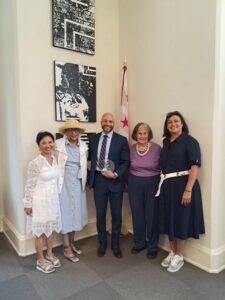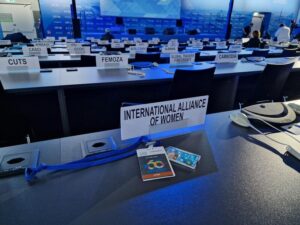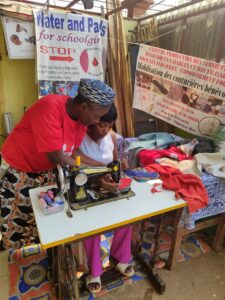On the Open Democracy website, Buki Adenekan writes that: ‘Nigerian women, who suffer most from poverty, climate change and violence, are valuable agents of change’. (13 February 2017)
She explains that 60% of Nigerians are living in extreme poverty, lacking water and economic livelihoods; 70% of this demographic are women and girls and over 2 million Nigerians have been forced to flee their homes.
In Northern Nigeria the Boko Haram terrorist group have been responsible for the destruction of property and lands and crop cultivation, with many farmers having to flee their homes. People remain unwilling to return home due to the fear of violence. Coupled with the high rates of poverty in the region, this has resulted in food insecurity and low food production.
Buki Adenekan writes that, ‘the effects of both ongoing violence and ecological destruction in the region have revealed gendered dimensions. Women have been deeply affected by the violent crisis in northern Nigeria and constitute a large portion of displaced persons (53%) across the region.’
She maintains that, ‘despite the patriarchal nature of societies across northern Nigeria, women in the region have played an active role in the campaign and fight against Boko Haram. They have positioned themselves at the forefront of protests against the insurgent group, especially in Abuja and Borno, where they have played an important role as vocal agents of change through political action and protests.’
Women have been placed in situations where they have no choice but to demonstrate their capacity for adaption in times of severe insecurity. When their husbands, brothers and fathers are killed they are forced to adopt leadership roles in the family and community and make difficult, painful decisions after burying their relations.
Sadly, many women, especially those who have returned from the captivity of Boko Haram, are stigmatised and their children – born as a result of their forced marriage to insurgents – are unwelcome in their home communities. In addition, many of these former captives are suffering from psychological distress resulting from the physical, sexual and mental abuse they experienced in captivity.
However, women as victims and survivors of violence is only one side of the story. They are also active participants in war, and it is important to understand the roles women play in the violence itself. Women in Boko Haram are capable of being conscious political-religious activists as well. They have been instrumental in Boko Haram tactics, which have been effective in advancing strikes across the region. Women are rarely suspected and can easily get away with concealing weapons in their clothing. This cooperation may be a way of escaping some of the sexual abuse experienced in captivity.
Adenekan concludes that, ‘women’s voices are being heard as protesters and proponents of peace against the conflict, but there is an absence of advocacy for female returnees from Boko Haram and a lack of livelihood opportunities for the internally-displaced who are living in camps. The faces and voices of returnees have been blurred by the societal stigma associated with the terrorist group. This could place women in more vulnerable situations and induce local grievances amongst them, leading to more violence.’
She maintains that, ‘it is important for the international community, the Nigerian government and relevant stakeholders to decisively focus on women as valuable agents of change and social mobilisers, with the ability to curb the impacts of violence and also environmental degradation. Women’s plights in displacement must be analysed and addressed with urgency, and women must be included in strategising, designing and implementation of interventions.’



